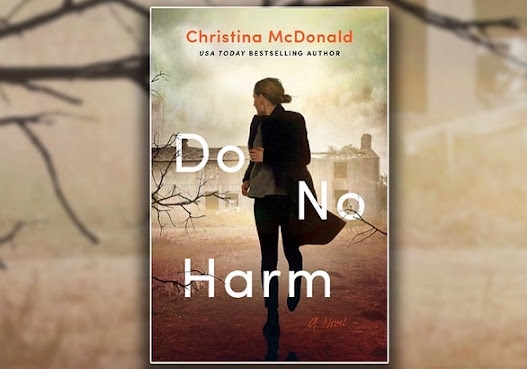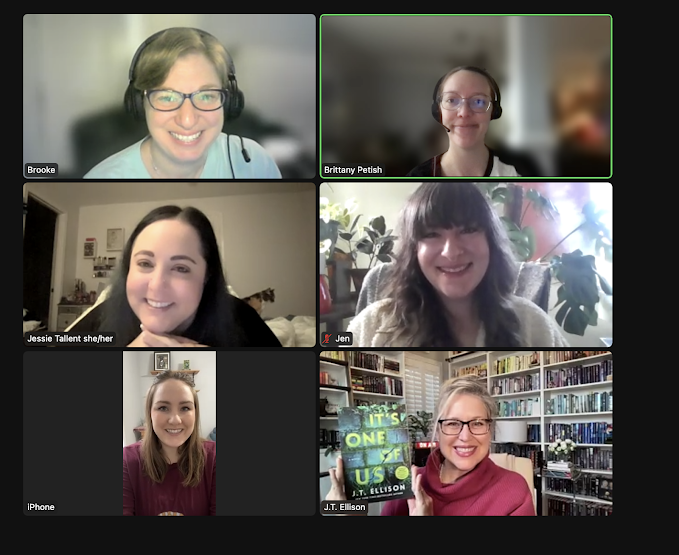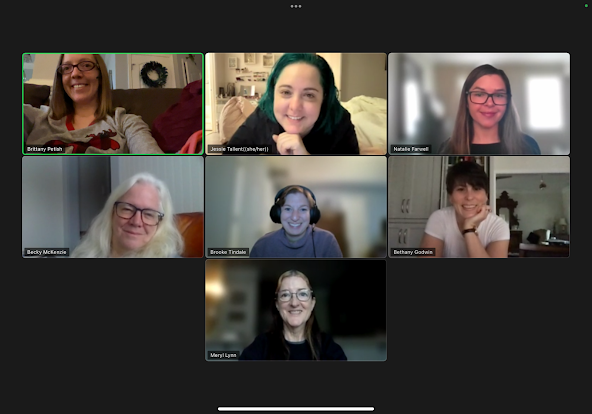Christina McDonald author of Do No Harm Joins SI Meeting Recap
Our past shapes our future, but how are our choices also shaped by desperation? Do No Harm explores the lengths a mother will go to save her son, at any cost. Author Christina McDonald joined us to discuss her connection to her story, and why she wanted her story to be as gray and hazy as a Seattle winter day.
Christina takes herself along for a ride with the reader as she writes; she knew her arc for Emma, but she lets Emma figure out where to go and what to do rather than plot her steps for her. Emma’s frantic desperation to keep her web of lies together is real; she doesn’t know what’s going to happen, only that she must grasp at whatever she can to save her son.
If Christina’s writing felt personal, this was intentional. Many of us in Shelf Indulgence have a connection in some form to the addiction epidemic, whether through family, friends, or work. Christina’s own experience shadows Emma’s; a brother battling addiction, in and out of treatment and relational awareness. When asked if he’s read the book, she falters; he inspired her, he’s given permission to have his story told, he has a dedication in the book, but if he’s read it, he hasn’t discussed it with her. Addiction is complicated.
And that’s the theme of the book Christina hopes her readers see. Addiction is complicated. Addiction, like Emma, is morally gray. And just like addiction, Emma seen through different lenses is beautiful, fun, loving, a fantasy, but also manipulative, selfish, dangerous, and fatal. Nate sees her as his touchstone to love, even when he knows that something is very, very wrong.
And who is to blame here? Is it the healthcare system that fails to provide the treatment patients actually need? Is it the dealers, who take advantage of a system all too open to corruption and manipulation? Is it the people caught in active addiction, shadows of themselves under the weight of a physical and mental disease? While Emma makes it very clear that she doesn’t care who is responsible or who gets hurt, it’s very clear that Christina McDonald does. And, like the story, the answer is gray.
Christina’s story had no choice but to end in tragedy. Emma reaches her goal; she saves her son, but at the cost of everything else. Christina repeats this sentiment a few times in our discussion. Despite knowing that Emma had to lose everything, she struggled with writing Nate’s death. She didn’t want to end the story that way, but as she told us; she’s not a plotter. Her characters led her there, and Nate’s death was inevitable. She cried and struggled for days writing in and around his death, mourning the loss of her story’s idealism. He had been a hard character for her to write, but her story demanded his perspective to be woven in, a contrast to Emma. We can't see her without seeing how he sees her. Christina had taken careful time to craft this man, fighting his vulnerabilities and wanting to be the 'good guy' for his son, and providing the stable family for his wife. While her son is the goal, Nate is Emma's tether to stability, and so, Emma must lose him.
History repeats; another loss laid at Emma’s lap that she will tuck away in her mind and smooth over, perhaps this time with a small white pill. We are left to imagine what will happen, but she’s learned nothing, and as any avid reader knows, nothing good happens to those who don’t learn their lessons.
There is little hope for Emma’s future, but we pondered whether Josh will grow up to be a cop like his father.
Nate’s idealism will perhaps live on.
And what does the future hold for Christina McDonald? There’s hope for a project she’s working on now, something to look forward to with strong themes and strong female characters. For now, she will edit and ride along with her current project in her near-London home with her family.
A bonus discussion over the trauma of math rounded out our talk, letting us laugh at our shared academic scarring. Teaching the new generations the new ways to math, it turns out, is just as traumatic as how we were taught the old ways. Funny how some of us completely blocked that time out, while others are haunted by that math turtle teasing us that math is simple and cute. Tears though, it seems, is the common denominator to learning math. We’ll stick to our calculators, thank you very much!





Comments
Post a Comment
Drop us a line and let us know what you thought about the book...